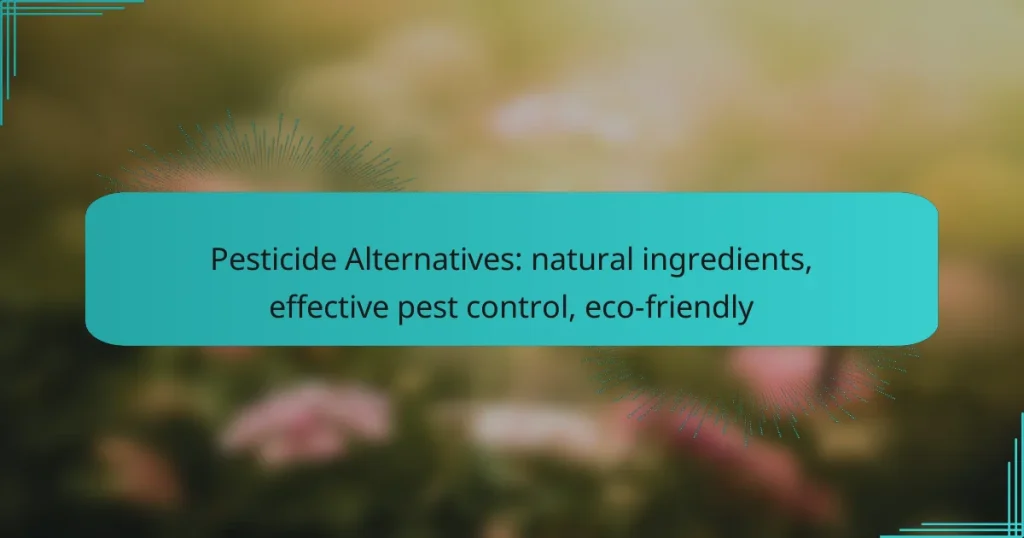Exploring pesticide alternatives made from natural ingredients provides an effective and eco-friendly approach to pest control. These alternatives, often derived from plants and minerals, offer a safer solution for both humans and pets while minimizing environmental impact. By choosing natural pesticides, you can effectively manage pest populations while promoting health and safety in your surroundings.

What are effective natural pesticide alternatives in Australia?
Effective natural pesticide alternatives in Australia include various eco-friendly ingredients that control pests without harming the environment. These alternatives are often derived from plants and minerals, making them safer for use around humans and pets.
Neem oil
Neem oil is extracted from the seeds of the neem tree and is known for its insecticidal properties. It disrupts the life cycle of pests, preventing them from feeding and reproducing. For best results, mix neem oil with water and a few drops of dish soap before applying it to affected plants.
When using neem oil, consider applying it in the early morning or late afternoon to avoid direct sunlight, which can reduce its effectiveness. Regular applications every week can help maintain pest control.
Diatomaceous earth
Diatomaceous earth is a natural powder made from fossilized algae that is effective against crawling insects. It works by dehydrating pests when they come into contact with it. Sprinkle a thin layer around the base of plants or in areas where pests are active.
Ensure to use food-grade diatomaceous earth for safety, especially in vegetable gardens. Reapply after rain or watering to maintain its effectiveness.
Essential oils
Essential oils, such as peppermint, lavender, and tea tree oil, can deter pests due to their strong scents. These oils can be mixed with water and a carrier oil to create a spray that repels insects. Use a few drops of essential oil per cup of water for a potent solution.
Test any essential oil mixture on a small area of the plant first to ensure it does not cause damage. Reapply every few days or after rainfall for continued protection.
Soap sprays
Soap sprays, made from natural soap mixed with water, can effectively control soft-bodied insects like aphids and spider mites. The soap suffocates the pests by blocking their breathing pores. A common ratio is 1-2 tablespoons of liquid soap per liter of water.
Apply soap sprays in the evening to minimize the risk of leaf burn. Avoid using soaps with additives or fragrances, as these can harm plants.
Garlic spray
Garlic spray is a natural repellent that can deter a variety of pests. It is made by blending garlic cloves with water and straining the mixture before use. The strong odor of garlic is unappealing to many insects.
For effectiveness, use fresh garlic and apply the spray every week or after heavy rain. Store any unused spray in a cool, dark place to maintain potency.
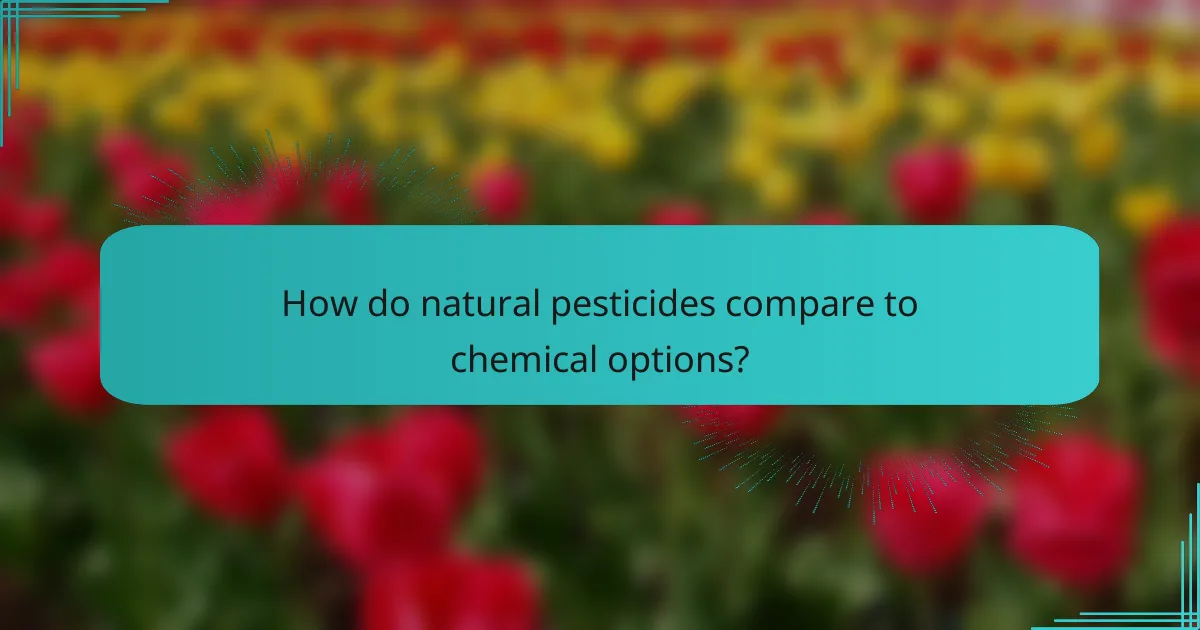
How do natural pesticides compare to chemical options?
Natural pesticides generally offer a safer alternative to chemical options, providing effective pest control while minimizing health risks. They are derived from plant or mineral sources and tend to have lower toxicity for humans and wildlife.
Lower toxicity
Natural pesticides typically have lower toxicity compared to synthetic chemicals, making them safer for use around children and pets. Many natural ingredients, such as neem oil and diatomaceous earth, are less harmful and often break down more quickly in the environment.
However, it’s essential to read labels and understand the specific active ingredients, as some natural pesticides can still pose risks if misused. Always follow application guidelines to ensure safety.
Environmental impact
The environmental impact of natural pesticides is generally less severe than that of chemical options. Natural pesticides are often biodegradable and less likely to contaminate soil and water sources. This makes them a more sustainable choice for long-term pest management.
When selecting a natural pesticide, consider its effects on beneficial insects, such as pollinators. Some natural solutions may still harm these species, so targeted application is crucial.
Effectiveness on pests
Natural pesticides can be effective against a variety of pests, but their efficacy may vary depending on the specific product and pest type. For instance, products like pyrethrin can effectively target insects, while others may work better for fungi or weeds.
It’s important to note that natural pesticides may require more frequent applications than chemical ones, as they often have shorter residual effects. Monitoring pest populations and adjusting application frequency can help maintain control.
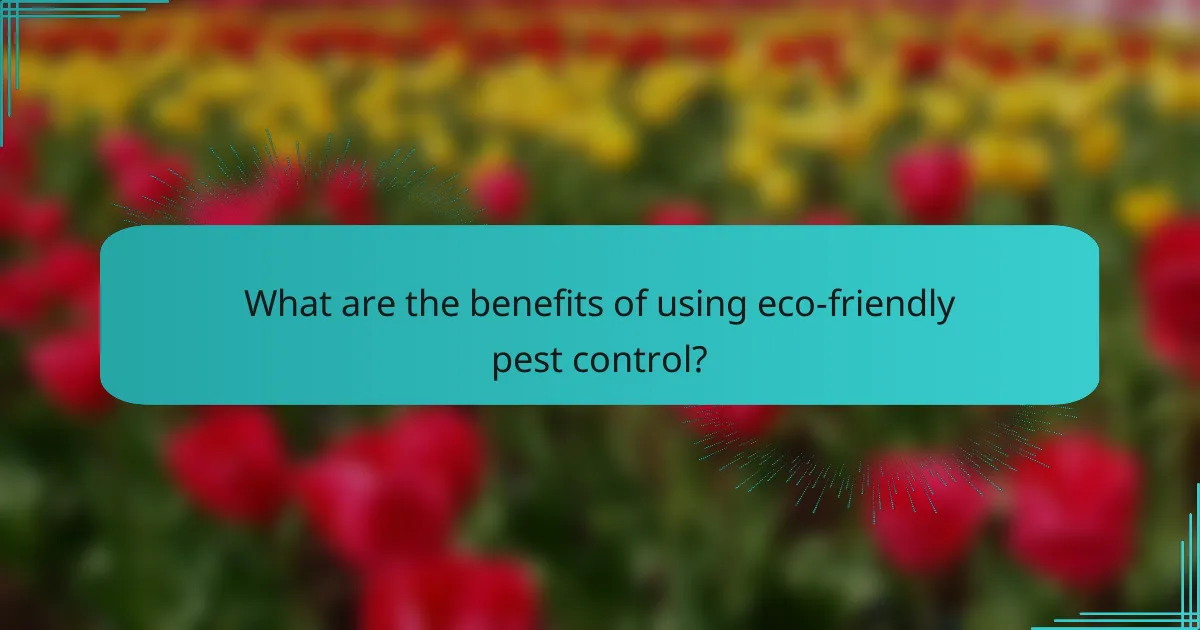
What are the benefits of using eco-friendly pest control?
Eco-friendly pest control offers several advantages, including improved health safety, enhanced soil health, and better protection for wildlife. By utilizing natural ingredients, these methods reduce harmful chemical exposure while effectively managing pest populations.
Health safety
Using eco-friendly pest control methods significantly reduces the risk of exposure to toxic chemicals for both humans and pets. Natural ingredients such as neem oil and diatomaceous earth are less harmful and can be safely used around children and animals.
When selecting pest control products, look for those that are certified organic or carry eco-labels. This ensures that they meet specific safety standards and are less likely to cause adverse health effects.
Soil health
Eco-friendly pest control methods contribute positively to soil health by avoiding synthetic pesticides that can degrade soil quality. Natural pest control techniques, like crop rotation and beneficial insects, help maintain a balanced ecosystem in the soil.
Consider integrating compost and organic fertilizers into your pest management strategy. These practices not only deter pests but also enrich the soil, promoting healthier plant growth and resilience against infestations.
Wildlife protection
Eco-friendly pest control is crucial for protecting local wildlife, as conventional pesticides can harm beneficial insects, birds, and other animals. By opting for natural alternatives, you help preserve biodiversity in your garden and surrounding areas.
Implementing barriers, such as row covers or companion planting, can deter pests without harming wildlife. This approach fosters a healthier environment for all species, ensuring that ecosystems remain balanced and thriving.
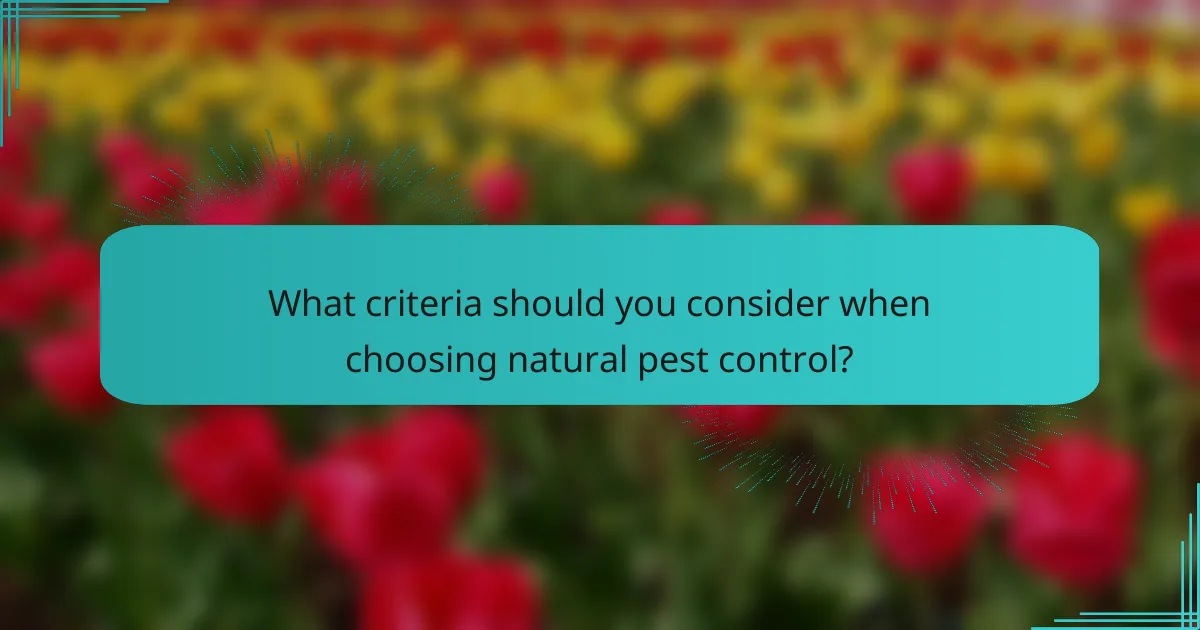
What criteria should you consider when choosing natural pest control?
When selecting natural pest control methods, consider the effectiveness against specific pests, the application method, and the environmental conditions. These factors will help ensure that the chosen solution is both efficient and sustainable.
Target pest identification
Identifying the specific pest you want to control is crucial for effective natural pest management. Different pests require different approaches; for example, neem oil may work well for aphids, while diatomaceous earth is effective against crawling insects. Understanding the biology and behavior of the target pest can guide your choice of natural ingredients.
Conduct thorough research or consult local extension services to confirm the pest’s identity. This will help avoid wasting time and resources on ineffective treatments.
Application method
The method of application can significantly impact the effectiveness of natural pest control. Options include sprays, granules, or soil drenching, each suited to different types of pests and environments. For instance, liquid sprays can provide quick coverage for leaf-dwelling pests, while granules may be better for soil-dwelling insects.
Always follow the manufacturer’s instructions regarding dilution and application frequency. Over-application can harm beneficial insects and the surrounding ecosystem.
Environmental conditions
Environmental factors such as temperature, humidity, and the presence of beneficial insects can influence the success of natural pest control methods. For example, certain natural pesticides may be less effective in high humidity or extreme temperatures. It’s essential to monitor weather conditions and apply treatments when they are most likely to be effective.
Additionally, consider the impact on non-target organisms. Timing applications to avoid peak activity periods of beneficial insects can help maintain ecological balance while effectively managing pests.
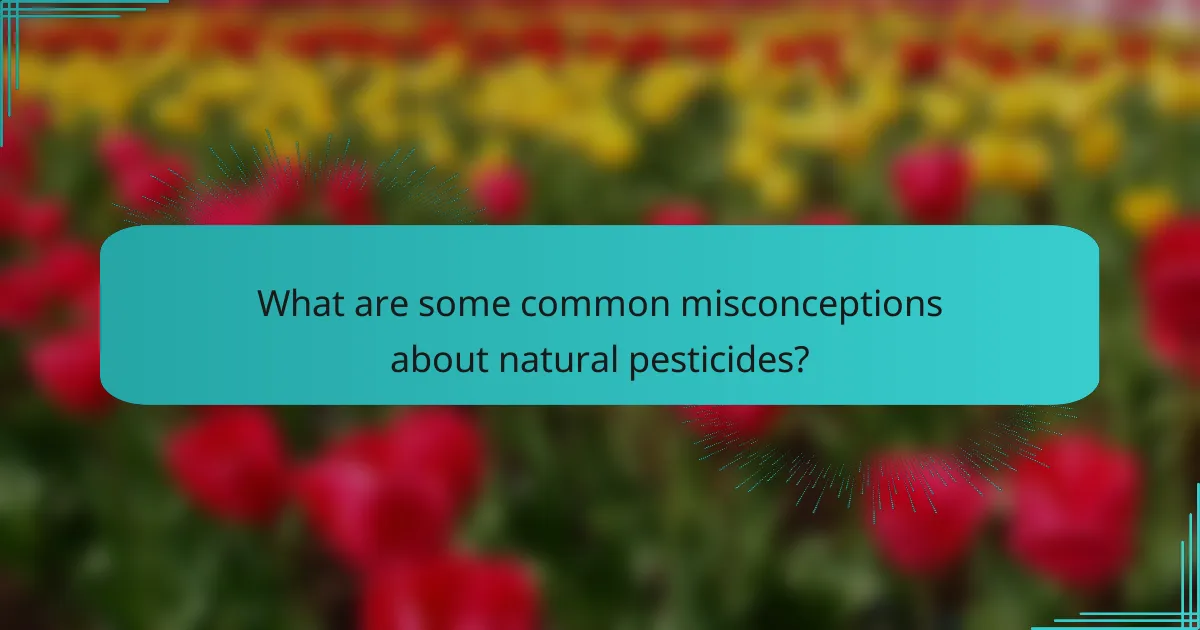
What are some common misconceptions about natural pesticides?
Many people believe that natural pesticides are always safe and effective, but this is not always the case. While they can be eco-friendly alternatives, their efficacy and safety depend on various factors, including the specific ingredients used and the target pests.
Natural pesticides are always safe for humans and pets
While natural pesticides often have lower toxicity levels compared to synthetic options, they are not inherently safe. Ingredients like neem oil or diatomaceous earth can still cause irritation or adverse reactions in sensitive individuals or animals. Always read labels and use products as directed to minimize risks.
Natural pesticides are less effective than synthetic ones
This misconception stems from the assumption that natural means weak. In reality, many natural pesticides can be highly effective against specific pests when used correctly. For instance, pyrethrin, derived from chrysanthemum flowers, is potent against a variety of insects, rivaling some synthetic chemicals.
All natural pesticides are environmentally friendly
While many natural pesticides are designed to be eco-friendly, not all are created equal. Some may still have harmful effects on non-target species or ecosystems. It’s crucial to research the environmental impact of specific products and choose those that align with sustainable practices.
Using natural pesticides means no need for precautions
Even with natural pesticides, precautions are necessary. Users should wear gloves and masks during application to avoid skin contact and inhalation of particles. Additionally, applying these products during calm weather can prevent drift and ensure they reach the intended target effectively.
